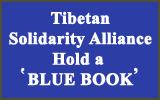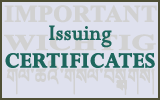Panelists: Resistance against Chinese Communist Party is Fight for Survival and World’s Worst Human Rights Abuser Should not be elected to UNHRC

Geneva: The Tibet Bureau Geneva hosted a virtual side-event paralleling the ongoing 45th UNHRC Session, on the topic “China’s Weapons of Mass-Subjugation: Surveillance, Camps and Cultural Genocide” yesterday. The panel discussion was broadcasted live via Tibet TV Facebook page.
Moderator, Thinlay Chukki, Special appointee for Human Rights Tibet Bureau Geneva opened the panel discussion by foregrounding the topic, China’s weapons of mass-subjugation through policies of surveillance, forming the basis for mass arbitrary detention and forced disappearances, the restrictions on freedom and concentration camps(political reeducation, legal education and patriotic camps) which attempts to systematically destroy the identity of “ethnic minorities” of China.
The first panelist, Lhadon Tethong, Director of Tibet Action Institute gave a brief overview on the overall human rights situation in Tibet including the recent labour camps and on how surveillance is being used as a means for total subjugation.
At the outset, she explained that China’s reference to Tibet as TAR( Tibet Autonomous Region) with over 3 million population is incorrect, which actually, refers to little under half of Tibetan population and less than half of Tibet’s total landmass. Citing the recent report on Tibet about the massive militarized labour programme in the TAR region which pushes Tibetans from traditional livelihoods into low-skilled jobs of the manufacturing and service industry and subjected to propaganda under the poverty alleviation programme. According to government data, a half million Tibetans were trained under this programme in the first 7 months of this year, with 50,000 transferred to jobs within Tibet and at least several thousand sent to work in China, adhering to a target quota for each region of the TAR to send workers to China resulting in punishments for failure to meet quota.
She opined that the government had been able to carry out the programme in secrecy due to the lack of access to Tibet for journalists, government officials, Tibetans in exile etc.
On surveillance of Tibetans, she described Tibet as ” high altitude, open air prison” where practically every person and every square mile is monitored through drones and the use of facial recognition technology at the borders and convenience police stations, spies, etc.
Seeking the total control of Tibetan population extending beyond the borders by using social media apps to monitor Tibetans around the world, Chinese government is trying to control and coerce Tibetans living in exile, especially, with family members in Tibet, she pointed out.
In the Chinese government’s final act it is claiming authority over the selection of His Holiness the Dalai Lama’s successor and using policies to do so. She noted that despite the bleak situation in Tibet, Southern Mongolia, East Turkestan and Hong Kong, the Chinese government can not last forever, and things are beginning to change with the world unifying against China.
Dolkun Isa, President of World Uyghur Congress described the overall human rights violations suffered by Uyghurs focusing on the concentration camps of over million Uyghurs.
Stressing that all countries must unify as it affected everyone, he said that the Uyghurs are particularly under threat of genocide, and the largest concentration camps in East Turkestan post WWII, mass sterilization of women, post birth measures, forced labour and modern slavery to destroy unique Uyghur identity, particularly the physical representation, destruction of mosques and religious persecution and indoctrination at the camps with an estimated 7.8 million Uyghurs.
Narrating his personal ordeal due to the Chinese government, he shared he had suffered for decades because China labelled him a terrorist and a Red-notice from Interpol against him leading to his detention many times in European countries until 2018 when the notice was deleted.
He noted that the ongoing genocide is happening as diaspora Uyghurs watch their family disappear and lose them without knowledge of their existence due to information blockade.
He called for unified stand against repression from the world as international institutions like UN are not acting against the genocide and only the USA had issued strong policies against China’s repression.
Enghebatu Togochog, President of the Southern Mongolian Human Rights Information Centre, spoke about the overall human rights violations suffered by Mongolians focusing on the recent language policy and the ensuing protests.
Enghebatu Togochog said that the Bilingual education policy which is essentially imposing Chinese language on Mongolians had roused the public into activism, across all walks of life who had marked their civil disobedience by coordinating protests, boycotting Chinese language classes and staging protests at foreign Chinese embassies, receiving global media coverage. Highlighting its significance, he noted it was the largest mass movement in mainland China since 1989 students’ protest with unprecedented levels of solidarity and coordination, not only in Southern Mongolia but across the world. To which China responded in routine fashion, by mass arrests, detention, house arrests, firing from jobs, blacklisting, denying loan access, confiscating property resulting in the death of at least 11 million Mongols in the past month.
Referring to China’s ethnic policy towards Southern Mongolian,as an extension of its past policies in the 60s and 70s of physical genocide, where atleast 100,000 had been killed and 500,000 persecuted, he said that the current cultural genocide is the second major genocide for Mongolians. At schools, children learning Mongolian have reduced drastically from 80% to 20% and now with this policy it is an attempt to remove the remaining 20%, which has roused “Mongolians who see it as the final blow to their culture and language, who have already lost their national independence, political autonomy, traditional way of life, environment destruction and language is the last stronghold of our national identity.”
Yang Jianli, President of the Citizen Power Initiatives for China, addressed the overall human rights violations suffered by Mainland Chinese focusing on the pro-democracy activists, human rights defenders and Hong Kongers; and proposed recommendations for challenging the dictatorship in China.
Yang Jianli, listed the Orwellian mass surveillance, cultural and political genocide, Sinicization of religions undertaken by China in Tibet, East Turkistan, Southern Mongolia and Hong Kong making national headlines. While observing the US stance on the atrocities happening in Tibet, East Turkestan, he recognized the necessity for building strong opposition within China, especially in the CCP regime and proposed 3 joint solutions to press the regime to open. 1) Advocate for world democracies to unite in holding China accountable for COVID-19, 2) Advocate for world democracies to establish formal diplomatic ties 3) Advocate for human rights NATO.
Citizen Power Initiatives for China had recently reviewed a comprehensive report “Examine China’s response to the Covid-19 outbreak September 2019- January 2020” an avoidable catastrophe which came at the cost of CCP’s control of narrative, covering up the source and extent of outbreak.
Yang Jianli stated that the world must hold China accountable for morality, governance, and to prevent another deadly pathogen and proposed for world democracies to establish democratic ties with Taiwan, strengthen Taiwan, whose response to COVID-19 and helped the world, proving its capability and trustworthiness as a partner, which deserved international recognition.
He explained, “The strategy to recognize Taiwan had great potential to split CCP leadership driving a wedge between hypernationalists and the leadership and embolden liberal democracies under China, including Tibetans, Uyghurs, Mongolians and Hong Kongers based on my understanding of China’s worldview” of middle kingdom that the ruler can not uphold if Taiwan is lost.
“Advocate for World democracies to form a human rights NATO, that will engage in collective confrontation and collective defense on issues pertaining to human rights. Because democratic rights routinely give way to economic interests. A treaty-based human rights NATO would help this turn around, it would preserve democratic values while protecting economic interests.“
Following the panelists address, moderator Thinlay Chukki took live questions from the audience through the comments section.




